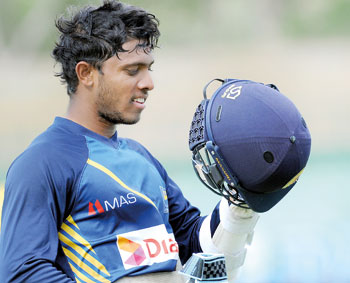Are foreign coaches paying for their keep?

Kusal Mendis another batsman who promised and delivered at the beginning is currently in the doldrums. Who is responsible?
After the debacle in South Africa, winning the T20 series against the virtual second string of Australia appears to be a ray of sunshine to Sri Lankan cricket fans. However the first two games were won in the last balls of each game proving the games went to the wire. Entertaining no doubt and refreshing watching Sri Lanka winning games irrespective at whatever level the games are being played,especially after a long and a grueling tour.
Do these wins portend whether Sri Lanka cricket is now progressing in the right direction? Probably not. After all,there are three levels international cricket now being played â Test, ODI and T20. Test cricket is at the helm followed by the shortened versions. T20 cricket is more a game of hit-or-miss and is mainly meant to entertain and not much else. It is not impossible that in the near future the format of the game from 20-over contests may be reduced to 10-over contests! The reason? Cricket, the once noble game, is now being ruled by money.
No wonder it is said that cricket moves faithfully alongside the tenor of the society in which we live in. No longer do statements such as âit is not cricketâ and he plays âa straight batâ hold water. Foreign coaches being paid huge wages play a significant role in the conduct of a nationâs cricket and are parachuted regularly. Batting, Bowling, Fielding coaches, Trainers et al, all foreigners with glittering CVâs, form probably the highest part of the salary sheet of a nationâs cricket administration. Yet, do they serve adequately what with possible communication problems with our local players? Yes, Dav Whatmore was our coach when we won the World Cup in 1996. Yet Whatmore has Sri Lankan connections and one must remember that Sri Lanka at that time was the most experienced team by far in the fray. Perhaps that made the life of the coach easier â he had the necessary material in his hands. Our own Chandika Hathurusinghe is a highly acclaimed coach helping Bangladesh with much success, proving that a prophet in not without honour in his own land.
Look at the present situation in Sri Lanka Â
Dinesh Chandimal, a former captain in the shortened versions of the game with an ODI average of 34 (four hundreds) and a Test average 41(seven hundreds)under his belt, has been relegated to play club cricket. Yet, here is the man who, inter alia, hit a century on his second ODI – against India – and not much later an unbeaten century at Lordâs to win a game! This is not all. In 2012 Chandimal won the Emerging player of the Year award. The Selectors in their wisdom appointed the batsman/wicket-keeper captain in ODI cricket thus Chandimal became the youngest ever to lead the team as well! At the moment Chandimal â just as most international players at certain stages in their career-is experiencing a slump in his batting. This is a knee-jerk reaction. Is relegating a player of this stature to play club cricket the answer? Certainly not. Just as a man who has fallen into a well has to be assisted out from the mouth of the well.
Dhananjaya de Silva, a player with much potential, has met with a similar fate. Kusal Mendis another batsman who promised and delivered at the beginning is currently in the doldrums. Then what is the mystery in the absence of Kusal Janith Perera? Suddenly we appear to have produced a batsman in Asela Gunaratne who has now been employed to play in the IPL as well.Will he be part of the answer to our batting problems? Of course time will tell. A freak innings may not deliver the goods in the long term, as Aristotle once said: âOne swallow does not a summer make.â By focusing his game on T20 cricket â that pays him well â will not promise him a bright future in the game as a whole. Gunaratne is a batsman who plays cricketing shots â as the pithy local term states he is not a âPol Adiyaâ. But as times goes, by concentrating his game on T20 cricket, will Gunaratne help form at least a part of the answer to our failing batting department? Why cannot our foreign coaches find the answers?At least that is what they are paid for. By simply assuming that our batsmen cannot cope with a moving ball is not the answer. The likes of Sangakkara and Jayawardena have proved that otherwise. As time goes batsmen may develop bad habits, that is where a coach can assist. Spot where the problem is and âtighten the screw.â
Our bowling, as proved by the South African batsmen, is worse than mediocre. In this background who are responsible for this state of affairs? What about our foreign fast bowling and spin bowling coaches? The current administration has also contributed to this state of affairs. For instance, just a couple of days before the recently concluded South African tour, the Team Manager was removed and a new man appointed. There were media reports that the Chief Selector was contemplating resigning from his post alleging interference. As a doyen of Sri Lanka cricket recently stated, inter alia: âToday every Sport has become a victim of politics. Their main concern is the election campaign and not the development of the sportâŠâŠâ
This situation in our cricket is reminiscent of what Marcellus told Horatio in Shakespeareâs play âHamletâ: âSomething is rotten in the state of Denmarkâ.


